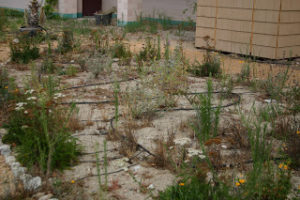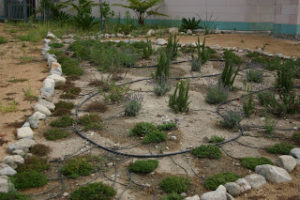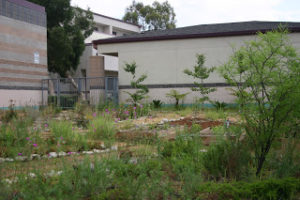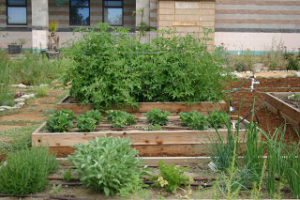One of the most difficult things about having a school garden is that school is out during the summer and it becomes hard to gain support to manage your garden. Fortunately if your garden is waterwise you won’t have too many weeds to have to pull, but it can still be a nuisance.
We just finished installing a garden at Rancho Cucamonga High School this past year, and Berenice Sealy the AP Environmental Science teacher called me with concerns about weeds and the overall health of her school’s garden. As you can see, her garden is very healthy, but there are some overgrown weeds.

Rancho Cucamonga High School Garden with some weeds about to be removed.
Since her garden was just installed this past year, it is still in its establishment phase. That means we have to water more often to keep the plants healthy so that their roots have a chance to get used to the soil at the school. That means the weeds also have more of a chance to grow because of the additional water. And because the weeds are grown from blown over seed and not transplanted, they are already used to the soil and can often be more successful than the transplanted climate appropriate plants. Some cultivars grow much quicker and establish themselves better as you can see in the above photo.
Mrs. Sealy has actually done an amazing job at keeping the weeds down in her herb garden and vegetable garden. But, since school is out and it can be hard to gain extra support, the task can seem daunting at times. As you can see, the herbs are still quite young and have yet to fill in so there is a lot of space for weeds to grow.

Weedless Herb Garden at RCHS. (All those rocks creating the border we found while digging!)
Most of the weeds are only horseweed and tumbleweed, so pulling them shouldn’t be too hard in their sandy and rocky soil. Some of you may be wondering why there isn’t any mulch under these plants. Well for drought tolerant plants, mulch can have a tendency to hold in too much moisture which can be bad for these plants. The other option is to use gravel, but at a school, gravel is often not a viable option.
Also, in the native area of her garden, the annual wildflowers that were spread by seeds are dying back and going dormant for the year. So at a new garden like this one, where the natives haven’t had a chance to grow in, the browned annuals can seem more prominent. It’s always up to you wether you want to leave them or not. If you leave them, the browned plants will decompose and go back into the soil, saving on nutrients, but if you remove them, it provides a “cleaner” look. We’ll probably knock them down and step on them to flatten them out so they don’t seem so prominent. As you can see, the natives are still quite young and have yet to fill in, just like in the herb garden.

Browned Annuals in the Native Garden. You can also see some horseweed doing well here.
In the summer months, it’s a good idea to spend at least one day a week weeding. Try to get the weeds before they get too big and before they reach maturity, otherwise they’ll send their seeds flying all over your garden. You don’t want to wait for them to flower and seed or you’ll just encourage weeds to return. With a new garden, the task is always more difficult for the first year or two, but it gets easier as the years go on and the desired plants become more established.

RCHS’s Vegetable beds doing wonderfully.
